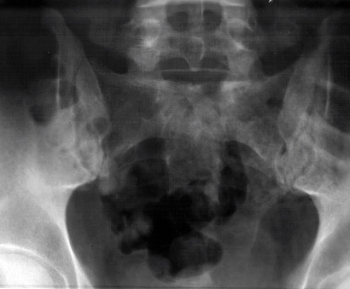The Shocking Risks, and Effects of a Kidney Infection

The Kidney Infection:
Pyelonephritis is the medical term for a kidney infection. Having a kidney infection is a very unpleasant, and painful illness. The tube that the urine passes through is the urethra, and is usually where a kidney infection begins when bacteria from the anus travels through it, and into the bladder, and then into the kidneys. When a kidney infection is promptly treated however it doesn't have to cause any serious harm, but you will not feel well as a result of the infection. It's important to know if it does go untreated though a kidney infection can cause some serious troubles including permanent kidney damage, or even death.
Who's Most at Risk to Develop a Kidney Infection?
Who's most likely to develop a kidney infection are women, and children. Since the urethra in women is closer to the anus, and with the urethra being much shorter than that of the male (the urethra goes through the penis of a man) bacteria can accidentally enter the urethra making women at a higher risk for a kidney infection than that of a man. So when the bacteria in a female reaches the bladder it makes it much easier to move directly into the kidneys. Children are also at risk because of a condition that allows some of the urine to back up in the bladder, and then infecting the kidneys, and resulting in a kidney infection.
The Symptoms of a kidney Infection:
Symptoms can develop very fast within just a few hours, or even just a few days. Symptoms include pain in the side and the lower back areas, fever and vomiting, as well as pain and discomfort in the genitals area, high temperature, feeling tired or weak, and a loss of appetite.
Additional Symptoms in Children:
Children may have other symptoms such as loss of energy, blood accompanied in their urine, also an unpleasant urine smell, vomiting, irregular rate of growth, jaundice which is the yellowing of the whites of the eyes, and additionally the yellowing of the skin.
When Should You Seek Medical Advice:
You should seek medical advice when you reach a high temperature, have pain that is persistent, or have a changing pattern in urinating. Prompt attention is important, and required when afflicted with a kidney infection. Treatment of antibiotics when prescribed is to help in the relief of the symptoms, and including the prevention of any developing complications that may occur.
Complications of Kidney Infections:
Developing complications with a kidney infection are rare, but the possibilities do increase if you are a child, or are over the age of 65, if you are pregnant, have diabetes, and if you have had a kidney transplant, have any kidney diseases that are chronic, including a weakened immune system.
Some Main Complications:
Kidney Abscess:
A kidney abscess is when pus develops in the kidney tissue which is rare, but is still a serious complication. Being more at risk for a kidney abscess is a person that has diabetes.
Blood Poisoning:
Another rare, but serious complication of a kidney infection is blood poisoning which happens when bacteria spreads to the blood stream from the kidneys. The infection can then spread to the major organs of the body as well as any other part of the body. Blood poisoning usually requires admission to a hospital as a medical emergency into the intensive care unit, and then having to fight infections with antibiotics.
Severe Infection:
A Severe Infection called Emphysematous Pyelonephritis (EPN) is also rare, but a potentially fatal complication resulting from a kidney infection. The severe infection (EPN) is when the kidneys tissues are quickly destroyed, and toxic gas then builds up within the inside of the kidneys all from the bacteria that originally caused the infection.
It's not clear the cause of (EPN), but most cases people have diabetes. Emergency surgery is the usual treatment for the removal of either some, or some of the kidney that's effected. However on a positive note it's still possible to live a full, and normal life with just one kidney.
Kidney Failure:
Once again in rare cases a kidney infection can result in severe kidney damage that can cause kidney failure. Potentially kidney failure is fatal, but with dialysis treatment, or receiving a kidney transplant it can definitely help.
Other Complications:
Other complications that are caused by a kidney infection is such things as high blood pressure, premature birth, or even premature labor.
Still other factors that can put you at risk of developing a kidney infection are kidney stones, and enlarged prostate, any condition that may prevent you from fully emptying your bladder, and then more spreading of the bacteria which can result in an infection.
A sexually active female is also at risk for a possible kidney infection if the urethra becomes irritated from sexual intercourse. This irritation can allow the bacteria to easily slip into the bladder after going through the urethra, and then can become infected. When a woman is pregnant it causes physical changes. These changes slow down the emptying of urine from the body, and then results in bacteria possibly spreading to the kidneys.
Prostatitis is when the prostate gland becomes infected, and the infection spreads into the kidneys from the prostate gland in a man. Bacteria can infect the bladder of a man by having anal sex when the bacteria goes up through the urethra to the bladder.
If you were born with an abnormality in the urinary tract you could also develop a kidney infection.
Can Kidney Infections be Prevented?
To prevent, or to lessen your chances of developing a kidney infection here are some helpful steps you can take:
1. Drinking three to four quarts of water per day is very helpful for your kidneys.
2. Citrus soda is useful, is also helpful by preventing a kidney infection.
3. The amount of vitamin C can vary while some people can take just 500mg per day, and others can take up to 4, or 5 grams without a problem.
4. Avoid taking bubble baths with all that sudsy water which can cause protection of the mucus at the entry of the urethra to break down, and to allow germs to get in.
5. For women after intercourse they should get up, and urinate as soon as it is possible. By urinating as soon as possible it eliminates the germs that may have actually gotten into the urethra.
6. Women should avoid wearing thongs since they cause a moist trail from the anus directly to the urethra. Cotton underpants instead are best to wear, or even cotton crotch underpants. The cotton prevents growth of organisms by allowing the moisture to evaporate.
7. As embarrassing as it is cleaning the correct way after using the toilet is important. In order not to carry germs from the anal, and then to the urethra the correct way to clean is from front to back.
The key to preventing a kidney infection is to keep your bladder, and urethra free of any bacteria. You can easily do this by following these simple steps, and especially drinking lots of fluids, and practicing good hygiene in the genital area. By taking these simple steps serious you can help to lessen your chances of developing any unpleasant, or fatal kidney infections.
